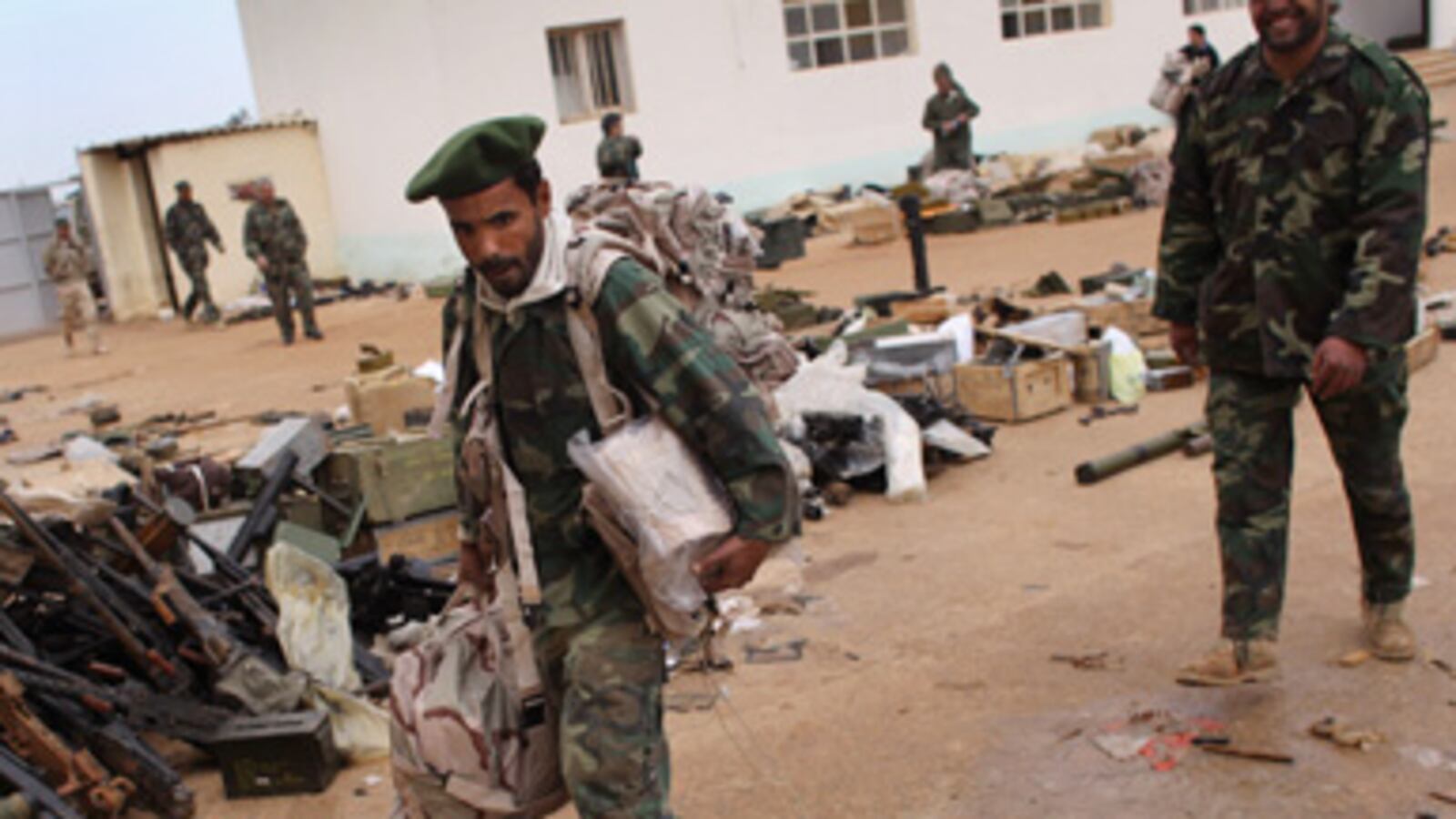With Gaddafi's former officers stepping up to lead the opposition, Libya's rebels grew more unified and armed on Sunday, revealing tanks and antiaircraft guns. Babak Dehghanpisheh reports from the ground. Plus, shocking photos and videos from Libya's streets.
Decked out in a hooded jelabiya robe and flip-flops, Mohammed Hawil, 37, gives little sign that 10 days ago he was serving as a colonel in the Libyan military in the eastern town of Ajdabiya. In fact, the dust-swept moonscape of the Sahara Desert around his base, combined with the robe, conjure surreal images of Obi-Wan Kenobi on Tatooine. But when Hawil, a tall man with a salt-and-pepper beard, speaks he's got the unmistakable, steely demeanor of a military man. He describes how he shed his uniform, along with hundreds of other soldiers in Ajdabiya, which is roughly 100 miles south of Benghazi, on February 17, the day of mass protests across the country. He and the army defectors then joined ranks with the protesters to take control of the town. "Our people were getting raped and killed by security forces and mercenaries," he says. "We had to protect them. We had to protect our families."
As Hawil is speaking, a pickup truck full of wild-eyed soldiers in green camouflage screeches through the base gates. "We caught them! We caught them!" they shout, swinging their AK-47s. They begin unloading box after box of new ammo from the back of the pickup truck. Once the soldiers have calmed down, they are able to explain what's going on. And it's disturbing. They just nabbed two defector army commanders—Hawil's colleagues—trying to raid an arms and ammunition depot in the city.

In the coming days and weeks, it's the loyalty of these rebel commanders that will determine the fate of Muammar Gaddafi, who also was a colonel in the army before he became an unhinged tyrant. In Benghazi, the capital of "Free Libya," well-meaning judges, lawyers, and academics are pushing hard to give their newly liberated zone some legitimacy. The formation of an interim council was announced today to oversee the management of the eastern portion of the country. The council appears to be a first step toward establishing an alternative government to Gaddafi's regime. But it's not city councils that will make or break the Libyan revolution. It's the men with the guns. And it's plain to see at any military base in the eastern portion of the country—where cracked, empty machine-gun, rifle and ammo cases are strewn about in abundance—that the population is arming up, blurring the lines between civilian and military and raising pointed questions about whose side everybody is on.
Ajdabiya is the one spot in eastern Libya where the loyalties of the military have shifted—and there's no better cliché—like the grainy, fine sand that blows through the town. There is nothing about Ajdabiya that makes it stand out. It's a small town of roughly 140,000 people with a collection of low-slung, nondescript buildings. But what sets Ajdabiya apart is its location: The town sits at a crossroads that ties together the country's east, west, and south and, perhaps more important, it's close to a key oil refinery in the nearby town of Brega. "If you take control of Ajdabiya, you can go anywhere in Libya," says Salehin Mohammad, 38, the editor of the Ajdabiya News newspaper.
The population is arming up, blurring the lines between civilian and military and raising pointed questions about whose side everybody is on.
• Peter Beinart: The Case for Sitting on our HandsSo when the uprising in the town kicked off, Gaddafi tried to squash it decisively by sending fighter jets. The first jet came February 18, dumped its bombs in the desert and turned back, a handful of city residents say. The second jet came last Wednesday and again the pilot bucked orders, but this time in a more dramatic fashion: He and his copilot ejected from the plane, which crashed in the desert. Town residents like to recount how a local shepherd freaked when he saw the two pilots floating down out of nowhere with parachutes. The pilot is now reportedly in a hospital in Benghazi and there are conflicting reports whether the copilot was detained or also taken to a hospital. Town residents are so proud of the high-profile snub to Gaddafi that they have now put the wing of that jet on display in a central square in Ajdabiya, which has been renamed Tahrir Square, for the epicenter of the recent uprising in Cairo.
This high-profile defection and defections of other senior commanders in the east make it seem as if the majority of the military has decisively shifted away from Gaddafi. But as the foiled raid in Ajdabiya today showed, there are still regime loyalists, potential sleeper cells, mixed among the rebel forces. At the entrance to the town, two rebel guards who had been carrying AK-47s in the early afternoon were toting large RPGs after news of the raid spread. Still, Hawil, the defector colonel, had no doubts about the outcome of the revolution. "We will continue this path until it's finished," he said, leaning in close to emphasize the point. "My children will grow up with dignity and they will be able to keep their head high."
Babak Dehghanpisheh was named Newsweek’s Baghdad bureau chief in December 2006. He has been covering Iraq regularly for the past five years.






